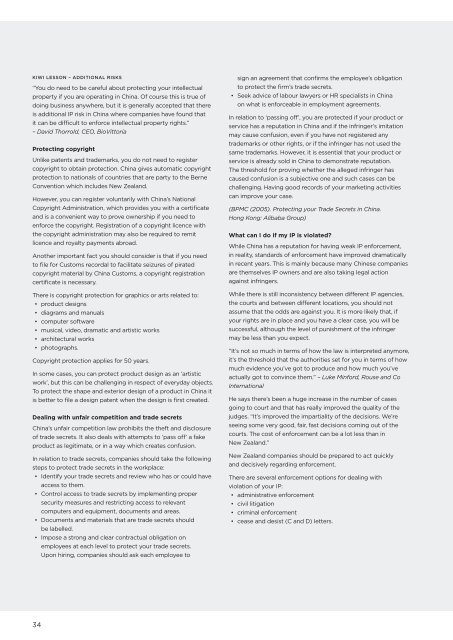Navigating China Guide (2012) - New Zealand Trade and Enterprise
Navigating China Guide (2012) - New Zealand Trade and Enterprise
Navigating China Guide (2012) - New Zealand Trade and Enterprise
You also want an ePaper? Increase the reach of your titles
YUMPU automatically turns print PDFs into web optimized ePapers that Google loves.
KIWI LESSON – ADDITIONAL RISKS<br />
“You do need to be careful about protecting your intellectual<br />
property if you are operating in <strong>China</strong>. Of course this is true of<br />
doing business anywhere, but it is generally accepted that there<br />
is additional IP risk in <strong>China</strong> where companies have found that<br />
it can be difficult to enforce intellectual property rights.”<br />
– David Thorrold, CEO, BioVittoria<br />
Protecting copyright<br />
Unlike patents <strong>and</strong> trademarks, you do not need to register<br />
copyright to obtain protection. <strong>China</strong> gives automatic copyright<br />
protection to nationals of countries that are party to the Berne<br />
Convention which includes <strong>New</strong> <strong>Zeal<strong>and</strong></strong>.<br />
However, you can register voluntarily with <strong>China</strong>’s National<br />
Copyright Administration, which provides you with a certificate<br />
<strong>and</strong> is a convenient way to prove ownership if you need to<br />
enforce the copyright. Registration of a copyright licence with<br />
the copyright administration may also be required to remit<br />
licence <strong>and</strong> royalty payments abroad.<br />
Another important fact you should consider is that if you need<br />
to file for Customs recordal to facilitate seizures of pirated<br />
copyright material by <strong>China</strong> Customs, a copyright registration<br />
certificate is necessary.<br />
There is copyright protection for graphics or arts related to:<br />
• product designs<br />
• diagrams <strong>and</strong> manuals<br />
• computer software<br />
• musical, video, dramatic <strong>and</strong> artistic works<br />
• architectural works<br />
• photographs.<br />
Copyright protection applies for 50 years.<br />
In some cases, you can protect product design as an ‘artistic<br />
work’, but this can be challenging in respect of everyday objects.<br />
To protect the shape <strong>and</strong> exterior design of a product in <strong>China</strong> it<br />
is better to file a design patent when the design is first created.<br />
Dealing with unfair competition <strong>and</strong> trade secrets<br />
<strong>China</strong>’s unfair competition law prohibits the theft <strong>and</strong> disclosure<br />
of trade secrets. It also deals with attempts to ‘pass off’ a fake<br />
product as legitimate, or in a way which creates confusion.<br />
In relation to trade secrets, companies should take the following<br />
steps to protect trade secrets in the workplace:<br />
• Identify your trade secrets <strong>and</strong> review who has or could have<br />
access to them.<br />
• Control access to trade secrets by implementing proper<br />
security measures <strong>and</strong> restricting access to relevant<br />
computers <strong>and</strong> equipment, documents <strong>and</strong> areas.<br />
• Documents <strong>and</strong> materials that are trade secrets should<br />
be labelled.<br />
• Impose a strong <strong>and</strong> clear contractual obligation on<br />
employees at each level to protect your trade secrets.<br />
Upon hiring, companies should ask each employee to<br />
sign an agreement that confirms the employee’s obligation<br />
to protect the firm’s trade secrets.<br />
• Seek advice of labour lawyers or HR specialists in <strong>China</strong><br />
on what is enforceable in employment agreements.<br />
In relation to ‘passing off’, you are protected if your product or<br />
service has a reputation in <strong>China</strong> <strong>and</strong> if the infringer’s imitation<br />
may cause confusion, even if you have not registered any<br />
trademarks or other rights, or if the infringer has not used the<br />
same trademarks. However, it is essential that your product or<br />
service is already sold in <strong>China</strong> to demonstrate reputation.<br />
The threshold for proving whether the alleged infringer has<br />
caused confusion is a subjective one <strong>and</strong> such cases can be<br />
challenging. Having good records of your marketing activities<br />
can improve your case.<br />
(BPMC (2005). Protecting your <strong>Trade</strong> Secrets in <strong>China</strong>.<br />
Hong Kong: Alibaba Group)<br />
What can I do if my IP is violated?<br />
While <strong>China</strong> has a reputation for having weak IP enforcement,<br />
in reality, st<strong>and</strong>ards of enforcement have improved dramatically<br />
in recent years. This is mainly because many Chinese companies<br />
are themselves IP owners <strong>and</strong> are also taking legal action<br />
against infringers.<br />
While there is still inconsistency between different IP agencies,<br />
the courts <strong>and</strong> between different locations, you should not<br />
assume that the odds are against you. It is more likely that, if<br />
your rights are in place <strong>and</strong> you have a clear case, you will be<br />
successful, although the level of punishment of the infringer<br />
may be less than you expect.<br />
“It’s not so much in terms of how the law is interpreted anymore,<br />
it’s the threshold that the authorities set for you in terms of how<br />
much evidence you’ve got to produce <strong>and</strong> how much you’ve<br />
actually got to convince them.” – Luke Minford, Rouse <strong>and</strong> Co<br />
International<br />
He says there’s been a huge increase in the number of cases<br />
going to court <strong>and</strong> that has really improved the quality of the<br />
judges. “It’s improved the impartiality of the decisions. We’re<br />
seeing some very good, fair, fast decisions coming out of the<br />
courts. The cost of enforcement can be a lot less than in<br />
<strong>New</strong> <strong>Zeal<strong>and</strong></strong>.”<br />
<strong>New</strong> <strong>Zeal<strong>and</strong></strong> companies should be prepared to act quickly<br />
<strong>and</strong> decisively regarding enforcement.<br />
There are several enforcement options for dealing with<br />
violation of your IP:<br />
• administrative enforcement<br />
• civil litigation<br />
• criminal enforcement<br />
• cease <strong>and</strong> desist (C <strong>and</strong> D) letters.<br />
34
















